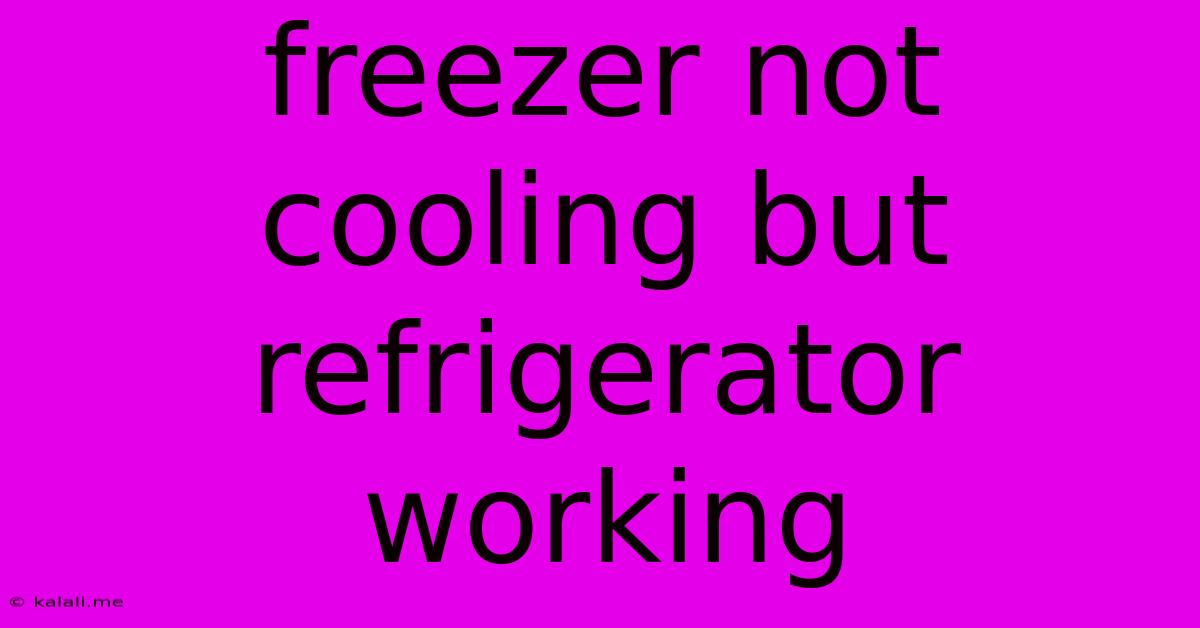Freezer Not Cooling But Refrigerator Working
Kalali
May 25, 2025 · 4 min read

Table of Contents
Freezer Not Cooling But Refrigerator Working: Troubleshooting Guide
Is your refrigerator humming along happily, keeping your produce crisp, but your freezer stubbornly refusing to freeze? This frustrating problem is more common than you might think, and often stems from easily fixable issues. This guide will walk you through troubleshooting why your freezer isn't cooling while your refrigerator is still functioning, helping you determine the cause and potentially saving you a costly repair call.
Possible Causes and Solutions:
Before you start, always unplug the appliance for safety before attempting any repairs or inspections.
1. Check the Freezer Door Seal
A faulty door seal is a common culprit. A poorly sealing door allows warm air to enter the freezer, hindering its ability to maintain a low temperature while the refrigerator compartment, being more insulated, continues to function.
- Inspection: Closely examine the rubber gasket around the freezer door. Look for cracks, tears, or any areas where the seal is compressed unevenly. A simple test is to close the door on a piece of paper; if you can easily pull the paper out, the seal needs attention.
- Solution: Clean the seal with warm, soapy water to remove any debris that might be interfering with its effectiveness. If the seal is damaged, it'll likely need replacement. This is usually a relatively simple DIY repair, but you might need to order a replacement seal specific to your refrigerator model.
2. Investigate the Evaporator Fan Motor
The evaporator fan motor circulates cold air within the freezer. If this motor fails, the freezer won't cool properly, even if the refrigerator compartment remains functional.
- Inspection: Locate the evaporator fan motor (usually near the back wall of the freezer compartment). Listen carefully for any unusual noises, like grinding or clicking. If the fan isn't spinning, the motor might be the problem. This often requires a bit more technical knowledge to access and inspect.
- Solution: If the motor is faulty, you'll likely need a replacement. Again, this might be a DIY repair depending on your comfort level and the appliance's design. However, seeking professional assistance is recommended if you're unsure.
3. Examine the Defrost System
Ice buildup on the evaporator coils can significantly impair the freezer's cooling capacity. If the defrost system malfunctions, this ice accumulation can be excessive.
- Inspection: If you can access the evaporator coils (often behind a panel in the freezer or refrigerator compartment), inspect them for excessive ice. A properly functioning defrost system melts away this ice regularly.
- Solution: If significant ice buildup is present, you might need to defrost the freezer manually, allowing the ice to melt completely. However, this is a temporary fix. Persistent ice buildup points towards a problem with the defrost system components, such as the defrost heater, defrost thermostat, or defrost timer, necessitating repair or replacement.
4. Check the Refrigerant Level
A refrigerant leak can severely impact the cooling capacity of both the freezer and the refrigerator. However, in some cases, the refrigerator might still function adequately while the freezer struggles due to the location of the components and how the refrigerant circulates.
- Inspection: Identifying a refrigerant leak requires specialized tools and knowledge. This isn't a DIY task; a professional technician needs to diagnose and repair refrigerant leaks.
- Solution: Professional repair is necessary. Refrigerant leaks are serious and require proper handling to avoid environmental damage and safety hazards.
5. Consider the Thermostat Settings
This may seem obvious, but double-check that the freezer temperature is set to an appropriately cold level. A thermostat that's set too high might not be cold enough to effectively freeze items.
- Inspection: Check the thermostat settings. Look for a dial or digital display to confirm that the temperature setting is adequately cold. Consult your appliance's manual for recommended temperature settings.
- Solution: Adjust to a lower temperature setting. Allow some time for the freezer to reach the new temperature.
When to Call a Professional
If you've checked these common issues and your freezer still isn't cooling properly, it's best to call a qualified appliance repair technician. Problems with the compressor, refrigerant lines, or other internal components require specialized knowledge and tools to diagnose and repair safely and effectively. Remember safety first! Attempting complex repairs without the proper expertise could worsen the problem or even cause damage to the appliance.
Latest Posts
Latest Posts
-
Get Standardized Coefficients And Confidence Intervals For Linear Model R
May 25, 2025
-
Out Of The Mouth Of Babes
May 25, 2025
-
How Do I Hang A Mirror On The Wall
May 25, 2025
-
Why Does My Cat Not Like To Be Held
May 25, 2025
-
Rebellion Is As A Sin Of Witchcraft
May 25, 2025
Related Post
Thank you for visiting our website which covers about Freezer Not Cooling But Refrigerator Working . We hope the information provided has been useful to you. Feel free to contact us if you have any questions or need further assistance. See you next time and don't miss to bookmark.